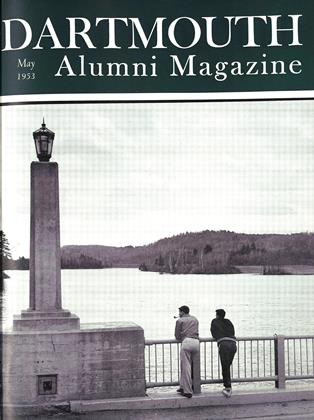OUR general formula for spice in this vehicle (which, in all modesty, we hold is better than our carriage) is the ancient bridal adage, "Something old, something new, something borrowed, and something blue." We try to alternate from month to month between the first pair. Number three is standard operating procedure, not our unique device. On number four, we hold back in deference to the sensibilities of our constituency.
What we have in mind for this round is the matter of place loyalty. Our contention for years has been that the core of alumni devotion has been at least fifty percent a blind love for the hills and valleys and unkempt streets of the Hanover locale. Certainly, to the unprejudiced eye there can be no extraordinary charm in Main Street, and even the beautiful College Green, with its flanking architectural melange, does not invariably captivate those who have never, even for one semester, strolled its paths as joint proprietors. For the rest of us, the fortunate, some intangible of local geography creeps into our bones and being to weave the town, as well as the College, into the spell assigned by Richard Hovey to the roamers of the girdled earth.
Other localities have their claims to affection, and to those who esteem the faintest memories of Paris we commend certain chapters of Prokosch's TheSkies of Europe, in which are devastatingly evoked the myriad scents and pastel shadings of that city of boulevards and chestnuts, making even the most dismal of all streets, the Rue Monge, an enticing recollection. Sofia, our favorite after Hanover and Paris, had a lazy delight in the '20's, with the first movie starting at 11 p.m., and Macedonian intrigue and assassinations and glasses of spritze around every corner. Pleasure is recalled in the coal smoke of Chicago railway depots, in the hurlyburly of Scollay Square, in an evening vista of Central Park South, and in the cordiality, mixed with oùζo, of the Skyriotes. The Kansas City stockyards have a flavor of their own; much fun has been had in a Model T on the West Boston Bridge and in cable cars in San Francisco; and there was once a wonderful February afternoon in Toulouse, a town in Languedoc as exciting and frigid as the campus during Christmas vacation.
We have often, for our sins, left Hanover in the late evening either by midnight taxi or in a bus with a team hopefully advancing to the fray: a Parting atNight with a ukase against "the blue spurt of a lighted match" and no candy bars or peanut brittle, either, in the hotel lobby. On such occasions we note landmarks for re-identification in the event that we return with, rather than upon, our shield: Mink Brook, the new cemetery, the Wilder dam, The Elms, and the pre-fabs in West Lebanon. Then into the glaring Broadway of White River Junction, and scrambled eggs and milk at the Mayfair to aid sleep and ease the pangs of emigration.
Meeting at Morning (to reverse Browning's English, now that April s here) is another thing entirely. Though no path of gold is promised, it is the return to a world of men. It may be a retreat from Moscow, or Ithaca, and fatigue has replaced excitement, but the first glimpse of the Library tower is a consolation as we speed back through the morning mists to the Hanover Plain, to the clanging bells, the crunch of feet on snow. Fearful lest our absence may have had some deleterious effect on the familiar landscape, we are warmed as we pass the Gulf station and Tanzi's, and attain the Inn corner to find intact the gleaming walls of Dartmouth, and all the friendly landmarks undisturbed.
Familiarity breeds an unthinking acceptance and, seated in Hanover, we doubtless do not savor the full keenness vouchsafed the occasionally returning prodigal. In our time, however, we have stood amid the alien corn and studied enough barbarian folk-thought to be assured that the village we hymn and its surrounding hills and woodlands have builded themselves in our hearts in a fashion that would be incomprehensible to denizens of Chapel Street or Washington Square or Mount Oread or The Farm.
One foul March morning we inquired of a serious undergraduate, who had been in the College one semester after serving time at how he would compare Hanover and Cambridge. He gazed at us with owl-eyed imperturbability and announced: "Oh, sir, Hanover wins on all points. The snow here is white instead of black; there are trees rather than bushes; and there is absolutely no diversion."
 View Full Issue
View Full Issue
More From This Issue
-
 Article
ArticleThe Dartmouth Lotteries
May 1953 By PHILIP G. NORDELL '16 -
 Article
ArticleBaker's Friends
May 1953 By PROF. HERBERT F. WEST '22, SECRETARY -
 Class Notes
Class Notes1918
May 1953 By RICHARD A. HOLTON, ERNEST H. EARLEY -
 Article
ArticleThe College Days of Sherman Adams
May 1953 By ROBERT S. MONAHAN '29 -
 Class Notes
Class Notes1929
May 1953 By GEORGE B. REDDING, F. WILLIAM ANDRES -
 Class Notes
Class Notes1928
May 1953 By OSMUN SKINNER, GEORGE H. PAS FIELD, WILLIAM COGSWELL
BILL McCARTER '19
-
 Article
ArticleNot So Long Ago .... Direful Days
March 1934 By Bill McCarter '19 -
 Article
ArticleThe Hanover Scene
February 1956 By BILL McCARTER '19 -
 Article
ArticleThe Hanover Scene
May 1956 By BILL McCARTER '19 -
 Article
ArticleThe Hanover Scene
January 1957 By BILL McCARTER '19 -
 Article
ArticleThe Hanover Scene
MAY 1957 By BILL McCARTER '19 -
 Article
ArticleThe Hanover Scene
June 1957 By BILL McCARTER '19
Article
-
 Article
ArticleLOCATION OF CAMPS, FORTS, AND FIELDS
July 1941 -
 Article
ArticleSuing Ourselves
SEPTEMBER 1987 -
 Article
Article1956
MAY | JUNE 2016 By —Joel D. Ash -
 Article
ArticleWith the Outing Club
March 1940 By Hans Paschen '28T -
 Article
ArticleWOODSMEN
January 1933 By J.S. M. '33 -
 Article
ArticleEastern Pennsylvania
January 1940 By Milt Shultz '30

